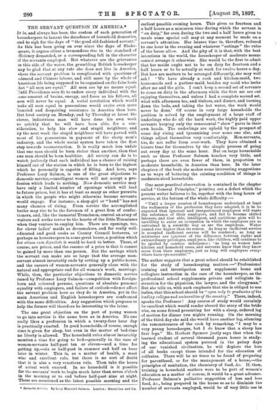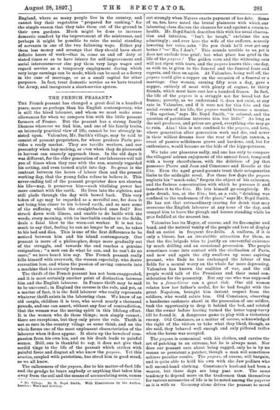THE SERVANT QUESTION IN AMERICA.*
IT is, and always has been, the custom of each generation of housekeepers to lament the decadence of household domestics, and to sigh for the days of "the good old-fashioned servant." As this has been going on ever since the days of Shake- speare, it argues either a tremendous rise in the standard of 4ficiency demanded, or a corresponding fall in the character of the servants employed. But whatever are the grievances m this side of the water, the grumbling British housekeeper any be glad that at any rate she does not live in America, where the servant problem is complicated with questions of Joloured and Chinese labour, and still more by the whole of imerican life being supposed to be organised on the false basis hat "all men are equal." All men are by no means equal. -Jntil Providence sees fit to endow every individual with the Jame amount of brains, energy, and force as his fellows, all men will never be equal. A social revolution which would make all men equal in possessions would excite even more frenzied and despairing resistance in America than here. But level society on Monday, and by Thursday at latest the clever, industrious man will have done his own work so quickly that he will have been able, for a con- sideration, to help his slow and stupid neighbour, and by the next week the stupid neighbour will have parted with most of his possessions in payment of the sharp man's industry, and the whole social system have taken the first step towards reconstruction. It is really much less unfair that one man should be born richer than another, than that one man should be born healthier. All society can do is to watch jealously that each individual has a chance of raising himself out of the station in which he is born to the highest which he personally is capable of filling. And here, says Professor Lucy Salmon, is one of the great objections to domestic service,—intelligent women will not accept a pro- fession which leads to nothing. Now domestic service may have only a limited number of openings which will lead to future prizes, but it has at least as many as other pursuits in which the people who might otherwise become servants would engage. For instance, a shop-girl or "hand" has not many chances of rising. From service the accomplished butler may rise to be the foreman of a great firm of confec- tioners, and, like the immortal Truncheon, control an army of waiters and strike terror to the hearts of the little Timminses when they venture to employ him. There are openings, too, for clever ladies' maids as dressmakers, and for really well- educated and good cooks as County Council lecturers, or perhaps as housekeepers in some great house, a position which for otium cunt dignit ate it would be hard to better. These, of course, are prizes, and the essence of a prize is that it cannot be gained by more than one person. Bat the savings which the servant can make are so large that the average man- servant almost invariably ends by setting up a public-house, and the careers of women-servants generally close with the natural and appropriate end for all women's work, marriage. While, then, the particular objections to domestic service raised by Professor Lucy Salmon—competition with foreign. born and coloured persons, questions of absolute personal equality with employers, and failure of outlook—do not affect the servant problem here as they do in America, yet in the main American and English housekeepers are confronted with the same difficulties. Any suggestion which proposes to help the former will therefore be interesting to the latter.
The one great objection on the part of young women to go into service is the same here as in America. No one really likes a profession in which a twenty-four hour day is practically exacted. In good households, of course, enough time is given for sleep, but even in the matter of bed-time no liberty is allowed. The household rules almost invariably mention a time for going to bed—generally in the case of women-servants half-past ten or eleven—and a time for getting up,—six or half-past in summer and half an hour later in winter. This is, as a matter of health, a most wise and excellent rule, but there is no sort of doubt that it is also a very vexatious rule. Then take the hours of actual work exacted. In no household is it possible for the servants' work to begin much later than seven o'clock in the morning or to end before half-past nine at night. These are mentioned as the latest possible morning and the
• Domestic Service. By Lucy Maynard Salmon. London: Macmillan and Co.
earliest possible evening hours. This gives us fourteen and a half hours as a minimum time during which the servant is "on duty," for even during the two and a half hours given to meals some special call may at any moment be made on a servant's attention. Her leisure time is, therefore, reduced to one hour in the evening and whatever " outings " the rules of the house allow. And the pity of it is that, with the best intentions in the world, the housekeeper of moderate means cannot arrange it otherwise. She would be the first to admit that her maids ought not to be on duty for fourteen and a half hours or to be actually at work for twelve hours a day.
But how are matters to be arranged differently, she may well ask ? We have already a cook and kitchen-maid, two housemaids and a parlour-maid. besides my maid who looks after me and the girls. I can't keep a second set of servants to come on duty in the afternoon while the first set are out enjoying themselves, and unless I had a complete second set, what with afternoon tea, and visitors, and dinner, and turning down the beds, and taking the hot water, the work would never be done.' Of course in very large households the problem is solved by the employment of a large staff of underlings who do all the hard work, the highly paid upper servants keeping only the ornamental " show " parts in their own hands. The underlings are upheld by the prospect of some day rising and tyrannising over some one else, and things adjust themselves very comfortably. Men-servants, too, do not suffer from over-work. They have obtained a leisure time for themselves by the simple process of going out every day at the same hour. But on large households such as these Professor Salmon touches very little, and perhaps there are even fewer of them, in proportion to moderate households, in America than here. In the later chapters of the book she makes some interesting suggestions as to ways of bettering the existing condition of things in moderate-sized households.
One most practical observation is contained in the chapter called "General Principles," pointing out a defect which the present writer believes to lie, together with the long hours of service, at the bottom of the whole difficulty :—
" Until a larger number of housekeepers understand at least the rudiments of the profession they have adopted, it is to be expected that ignorant and inexperienced employees will waste the substance of their employers, and fail to become skilled laborers, and that able, intelligent, and ambitious girls will be unwilling to enter an occupation in which the employers are as untrained in a soientific way as are the employees. Water cannot rise higher than its source. As long as inefficient service is accepted inefficient service will be rendered; as long as mistresses are ignorant of the difference between rights and extraordinary privileges, employees, like children, will continue to be spoiled by careless indulgence ; as long as women hate kitchen and household cares, and servants know that they know more than their employers, just so long will employers every- where have eye-servants."
The author suggests that a great school should be established for the study of housekeeping matters :—" Professional training and investigation must supplement home and collegiate instruction in the case of the housekeeper, as the
professional school supplements private and collegiate in- struction for the physician, the lawyer, and the clergyman." Bat she tells us, with such emphasis that she is obliged to use italics, that this school should be "open only to graduates of the
leading colleges and universities of the country." There, indeed, speaks the Professor I Any course of study would certainly be excellent which would render absurd the story of the bride who, on some friend presenting her with a sheep, ordered leg of mutton for dinner two nights running. On the morning of the third day she said she would have another leg, silencing the remonstrances of the cook by remarking, "I may be a very young housekeeper, but I do know that a sheep has four legs." Mr. Herbert Spencer justly says that when the learned student of several thousand years hence is study- ing the educational system pursued in the palmy days of oar vanished civilisation, he will deplore the loss of all books except those intended for the education of celibates. There will be no trace to be found of preparing for parenthood, or for the management of a house,—the principles of sanitation, the chemistry of food, Ste. If, then, training in household matters were to be part of women's
education as a matter of course, it would be a great advance. Professor Salmon's palliative suggestion of less and less food, &c., being prepared in the house so as to diminish the
number of servants employed, would be of very little use in England, where so many people live in the country, and cannot buy their vegetables "prepared for cooking," for the simple reason that they take them out of the ground in their own gardens. Much might be done to increase domestic comfort by the improvement of the mistresses, and perhaps it might be possible to raise the social standing of servants in one of the two following ways. Either pay them less money and arrange that they should have short definite hours of work—that is, come on and off duty at stated times so as to have leisure for self-improvement and social intercourse—or else pay them very large wages and regard service as a temporary employment during which very large earnings can be made, which can be used as a dowry in the case of marriage, or as a small capital for other purposes. In fact, treat domestic service as we have treated the Army, and inaugurate a short-service system.



































 Previous page
Previous page